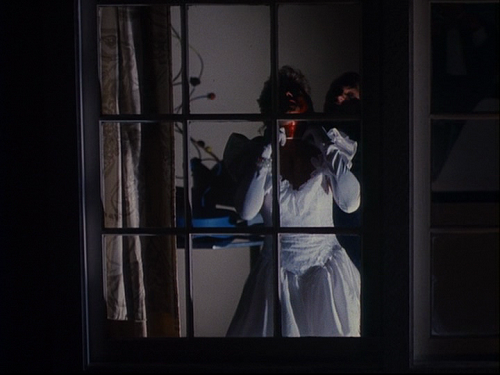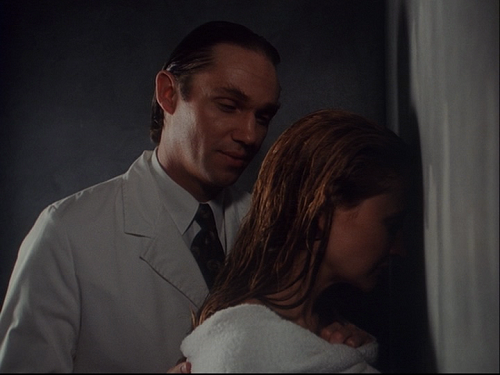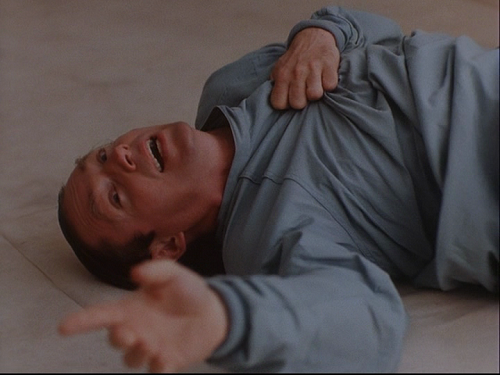
In 1989 HBO debuted Tales From the Crypt,
a horror-anthology show with an unprecedented amount of tits, gore,
budget, and bad puns. Based on a variety of titles from EC Comics, the
episodes ranged from silly to creepy to horrible. And we’re going to
review every single one of them.
a horror-anthology show with an unprecedented amount of tits, gore,
budget, and bad puns. Based on a variety of titles from EC Comics, the
episodes ranged from silly to creepy to horrible. And we’re going to
review every single one of them.
——————————————————
[This entry by John B.]
Mute Witness to Murder (2.15)
“You’d be very good at Charades, if you weren’t about to die”.
WHAT IS IT?
A young woman is struck dumb when she witnesses a murder from her balcony, and finds herself at the mercy of the killer, a psychiatric doctor.
WHO’S RESPONSIBLE?
The cast is headlined by a pair of recognizable faces. Patricia Clarkson was pretty much unknown at the time, but has since more or less exploded upwards, becoming one of the more reliable character actresses around (she just had great roles in Shutter Island and Easy A). She plays Suzy, the protagonist, and yet still a supporting role next to Richard Thomas (The Waltons, Stephen King’s It), as the villainous Dr. Trask. The director and the writer are a couple of people named Jim Simpson and Nancy Doyne, and neither seems to have had much of a career in Hollywood, which is a shame, because they do pretty well.

HOW IS IT?
Pretty classy, all in all. It’s got its problems, but the overall vibe here is a solid and diverting Hitchcock pastiche. It’s not difficult to imagine how this played in comic format, and even there, it was doubtless very much in keeping with Hitch’s familiar motifs and tone, but in adapting it to the screen, Simpson and Doyne have done a great job of evoking the melodramatic drawing room murder plays popular in the 50s. And even though the episode opens with a overt reference to Rear Window, it really has a lot more in common with Alfred Hitchcock Presents, the suspense anthology show the baby boomers watched when they were kids. Not really a horror show, or at least not like Outer Limits or Twilight Zone, AH Presents focused more on suspense and morality plays, but there’s a good deal of connective tissue anyways, such as violent death and poetic justice.
Indeed, this episode might as well have started with the Death March of the Marionette for how similar in tone it is. It opens in the NY loft of a pair of affluent young people, Suzy (Clarkson) and Paul (Reed Birney, not much of a presence). They’re kind of adorable, and have to cut a dinner party short because they’re just so in love with each other and can’t wait to enjoy some sex. Paul steps out for a moment, just long enough for Suzy to step onto the balcony and watch their neighbors, the Trasks, come home and fight. It’s a pretty bad one, as it turns out, and it ends with Dr. Trask (Thomas) murdering his wife with a garrote. Which seems careless, as the way this particular balcony is set up, the Trasks must be used to having every aspect of their life on full display for Suzy and Paul. Seeing this causes poor Suzy to go spontaneously mute, and in the immediate moment, near catatonic. When Paul returns and finds her in a state of shock or whatever, he makes the huge-ish mistake of going and collecting Dr. Trask, their neighbor. Trask quickly assesses the situation and makes the required mental leaps to realize who saw what. Acting with remarkable cool for a man who just got spotted murdering his wife in a fit of rage ten minutes ago, Trask manages to bully Paul into helping him sedate Suzy and commit her to Trask’s own personal asylum.

One of the chief positives about this episode is Richard Thomas as Dr. Trask. He’s so good I wonder why he didn’t play bad guys more; he certainly looks like one. Once Suzy is secured in a padded room and straight jacket, Trask gets to deliver a delightful bad guy monologue about how he’s not proud of it, but she’s fucked now, and that’s all there is to it. He even adds an addendum about how he’s totally not going to rape her, but his wandering hands tell a different story. Thomas does the right thing here, in that he underplays everything, which I’m coming to think of as the best way to approach Crypt material. It’s always a bit hammy, especially in what is essentially a melodrama like this, so like Moses Gunn some weeks back, playing it straight tends to give you the best of both worlds. He’s also oily and brutish and sometimes reminded me of the villain in Kindergarten Cop (Crisp!), so well done, Richard Thomas. It’s a character written with a lot of zeal and flavor too, and considering Suzy is necessarily inactive, he holds the story together. There’s a scene in the middle where Trask tries to bond with Paul over how frustrating the “constant yammering” of marriage can be that makes Trask a little more grounded with his particular smart/crazy cocktail.
Meanwhile, clueless Paul is hanging out with his sister, who says what we’ve been wondering the whole time: ‘Why the hell do you trust this doctor so much, dumbass? Weren’t you supposed to be super in love with your wife?’ This motivates Paul to ‘do something’, which we learn when he stares out a rainy window and mumbles vague plans purposefully (it’s the worst moment in the ep). Said ‘plans’ involve him forcing his way into Trask’s asylum and demanding to see Suzy. Trask allows this, but when Paul manages to finally communicate with Suzy, which is more or less exactly as simple as you’d imagine communicating with a mute would be, Trask busts in with a murder syringe and drops Paul. Suzy is still restrained, so again, she does nothing while Trask snaps the poor dude’s neck with his wingtip.
One of the clumsier storytelling issues here is Trask’s weakness, his bad heart. This device is somewhat necessary, but every time he grabs his chest and we hear heartbeats on the soundtrack, we might as well have Trask deliver a monologue explaining that this is how he will ultimately be defeated. Not that Trask is wanting for monologues. He delivers another one to Suzy, explaining he’s been dealing with a lot of stress, and his weak heart is forcing his hand. She’s going to be lobotomized…fatally! And oh yeah, he’d rather like to fuck her, right here in this supply closet. But he doesn’t. The matronly nurse might hear. On the day of the lobotomy, Trask comes to collect her personally, possibly hoping she’ll want one last screw before the operation. This might seem like absurd nonsense, but they’ve done a good job of establishing Trask as a crazy narcissist. Naturally, once she’s out of her straight jacket, she goes right for the eyes, and they struggle briefly before Doc’s bad ticker becomes an issue. He crumples to the ground, with time for one last monologue, and as a special treat, it’s one of the best a villain can hope for: cowardly pleading. Truly, it’s how I want to go out, scared and pathetic. But then Trask realizes his craven weeping is fruitless. She can’t call for help because she’s mute! Except she’s not. Her voice restored by Trask’s comeuppance, Suzy tells him she could save him and chooses not to, because he deserves to die. Ever the bitch, Trask calls her a murderer and expires. She heads over to the camera, and lets the world now that he’s dead, unable to keep from breaking out in laughter. Is she really crazy now?
The ending lacks the punch of a good Agatha Christie potboiler, which is what it kind of needed. There’s a bunch of obvious things that would logically have prevented most of the plot machinations that you just have to overlook. Suzy is ostensibly the heroine, but there’s only so much a character can do mute and tied to a bed for most of the runtime (Trask mitigates this somewhat). But these are all hallmarks of the Victorian melodrama, just like the gothic setting and overt foreshadowing. Melodrama is really an underrated genre, to my mind. It’s easy to punch holes in, and it’s easy to screw up, but if the tone is right, it can be gripping. Hitchcock knew it, and it’s all over Strangers on a Train, Frenzy, and Rear Window. It’s a lot of fun, and it’s outside of Crypt’s usual wheelhouse in a fresh way. And Dr. Trask pulls of the moustache twirling with a soupcon of God Complex panache. Despite the flaws, it’s one of the season’s best.

HOW EVIL ARE THE WOMEN?
Aha, what we’ve got here is practically feminist, and not only in the conspicuous scene where Paul’s sister calls him out for behaving like a dumbass. Suzy’s plight is reminiscent of now-dated trope, the Woman No One Believes. It’s taken to the extreme here, giving this victim literally no voice at all. Shades of unheeded females from Rosemary’s Baby to Orphan exist, if not in the episode, in its margins. It’s not really a theme that gets hit with a lot of conviction, but in the first episode with a female writer credited, it doesn’t go unnoticed.
ALSO WORTH NOTING:
*Here in New York, I’ve had the chance to see Richard Thomas on stage twice, as he’s a highly respected theater actor. Based on his performance in Stephen King’s It, it’s been a surprise to discover that he’s really quite good.
*Speaking of the theatah, there’s a very weird cameo from one of the most famous living playwrights in the opening dinner sequence. Christopher Durang plays Paul’s brother-in-law. It’s a nothing role, and it’s tough to imagine the circumstances that got him there.
*I really like the B&W video close-up footage from the padded room. It creates a small narrative all on its own. There’s a lot of good lighting here, with lots of black shadows contrasted with bright white walls, and it evokes the B&W color palette throughout, a la Alfred Hitchcock Presents.
WORST CRYPT KEEPER JOKE:
“There’s a villain with a heart – attack, that is!”
GRADE: B+
PATRICK SAYS:
I agree that this is one of the best episodes of the season, and it’s certainly the weirdest. Putting aside the sweaty and gross sexuality of Trask, there’s something really confusing about the design of his asylum. For one, all the cell doors are automatic, opening straight up into the ceiling like it’s the Death Star. And all the video monitors in his really dark office, like he’s Adrian Veidt or something. I’m not sure if this was supposed to be a futuristic asylum or if the set designers just went a little crazy, but it adds a weird layer of artifice to the whole thing and heightens the melodrama. A better twist would have made this A material.